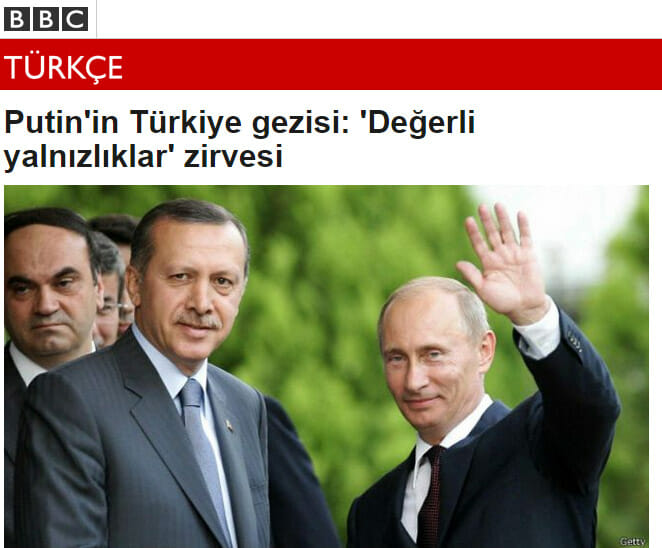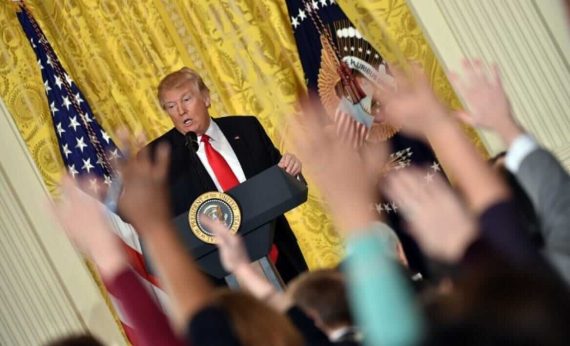The various discussions that have commenced with the election of US President Donald Trump have continued on a global scale as well as within the United States. Two main reasons exist for these debates. The first is xenophobia and Islamophobic rhetoric that is prevalent in his discourse. The second is the current order who cannot accept Trump as President and the attitude of the media establishments regarding this stance. Generally speaking, it is possible to narrow this down to two focal points, with one side being in favor of Trump and the other firmly opposing his election. Media conglomerates had also been at the center of this debate during the election campaign, taking their positions with either party.
As per tradition for Presidential elections, a number of the pioneering media establishments in US media made statements supporting either the Democratic or the Republican Party. But many of the endorsements came from outlets that traditionally remain silent, and this time there was an unprecedented across the board sentiment against one candidate, Trump. For example, USA Today had announced that for the first time in its 34 year history it would weight in on an election, saying that it would stand against Trump. Foreign Policy magazine, breaking tradition for the first time in almost 50 years, said it would endorse Hillary Clinton. Another magazine, The Atlantic, published an editorial piece throwing their unwavering support behind Clinton and opposed Trump’s presidency. In its 159-year history, the only other time this had taken place was when the magazine endorsed Abraham Lincoln in 1860 and Lyndon B. Johnson in 1964. In addition, leading broadcasting services CNN and NBC were also firmly against Donald Trump. The Washington Post, one of the most widely circulated newspapers in the United States instead preferred to use the phrase “Trump is not suitable for the US Presidency” whilst The New York Times made known their position for Hillary Clinton by stating that their support for her was a result of her intellect, experience, toughness and courage spanning over a career of almost 40 years of continuous public service.
As the November 8 2016 Presidential election drew near, such statements that indicated the position of many media establishments increased substantially with virtually the entire US media showing support for Hillary Clinton against Donald Trump. The mainstream media firmly believed that the Democratic Party would win. Similarly, many of the public polls and surveys conducted throughout the election campaign predicted and in fact, confirmed, that Clinton would be victorious. The result was contrary to all expectations. Despite the propaganda campaign, Trump won the election and like the first signals that he had given during the beginning of the election campaign, his tirade of vilification and condemnation against the media multiplied substantially.
Trumps’ fury at US media
Launching a barrage of attacks on the American media, Trump’s expressions have surpassed the line of criticism with his stinging, voracious attacks that have bordered on dragging names through the mud as well as going so far as threatening to litigate legal cases aimed at shutting down some outlets. Trump has repeatedly said that the “media are the biggest liars on earth” and his repetitive use of this statement clearly is a reflection of his attitude. In his first official White House press conference, the dialogue between himself and reporters from CNN and the BBC in front of the world was a striking example of this attitude. During the press conference, Donald Trump refused to answer a question from a CNN reporter and turned to the CNN camera saying that “Not you. Your organization is terrible.”
During a press conference held at Trump Tower, Donald Trump turned to CNN executive Jeff Zucker and derided the network saying, “CNN news network is completely false. I hate your network, everyone at CNN is a liar and you should be ashamed….” Referring to the NBC News network and Time magazine, Trump also condemned the establishments saying “the media is trying to marginalize me by lying.”
During the Obama presidency, tradition called for the Associated Press to ask the first question at White House briefings. Trump did not allow for this to happen.
Without a doubt, photographs clearly showed the Trump inauguration had a far lower turnout than the 2009 inauguration of Barack Obama. A Time magazine correspondent incorrectly reported that Trump had removed a bust of Martin Luther King Jr. from the Oval office, adding more fuel to Trump’s media fury. Regardless, despite the passing of these events, Trump’s battle with the media over Twitter has not diminished. During the most intensive Twitter rants, he continued to name names and on more than one occasion, has made many generalisations concerning the “false” reporting of the American media. On February 6th 2017, Trump made outright attacks on the American media. Launching a Twitter tongue-lashing against the New York Times who had revealed embarrassing White House revelations, he said in one message that “The failing NY Times writes total fiction concerning me. They have gotten it wrong for two years, and now are making up stories & sources!” His vendetta against the media continued with attacks on CNN, ABC, and NBC, claiming these news organisations were making a deliberate attempt to bring people into the streets and that they wanted to replace him with a President of their choice.
.jpg)
Undoubtedly, media establishments outside of the US are also receiving their fair share of criticism.
When looking at Trump’s vitriol towards the media and the media’s approach to Trump, it goes without saying that it is a battle that has only just begun.
Media remembers “ethics” after Trump experience
The constant humiliation of news establishments by Trump and his treatment of reporters during the press conference have opened a new front line regarding freedom of the press, freedom of expression and the position of media within a democratic society. Gary Gutting wrote an op-ed for the New York Times, where, after painting a picture of the current climate, he concluded, “recent events, here and elsewhere, revive the worry, expressed by Plato, that populist democracy can readily pave the way to dictatorship. Resisting this threat (and this temptation) is the first duty of today’s patriots.” In his piece, Gutting essentially built a wall against the Trump administration, tying it up with the founding principles of the US and the principles of democracy.
A more direct response to Trump’s media attack came from Reuters in the form of an editorial from its editor-in-chief Steve Adler, entitled “Covering Trump the Reuters Way.” In his piece, Adler noted that the worldwide news agency operated in more than 100 countries around the world and stressed principles of neutrality and independence in the face of challenges such as censorship, legal prosecution, visa denials, and even physical threats to journalists. Adler stressed Reuters would continue to pursue critical reporting on the Trump administration because it’s part of their own journalistic principles.
In a news commentary headline, the BBC asked whether Trump’s accusation of media “not reporting terrorist attacks” was true, by running a long assessment of the terrorist attacks around the world one by one and whether they were covered by the BBC. One can ascertain that the BBC had in fact relayed news regarding terrorists attacks to its readership and that it had related this information on the basis of its professionalism of its journalistic integrity, and that Trump, whether deliberately or ignorantly, was trying to blame the media.
Evidently, media organisations around the world took issue with Trump’s accusations and found themselves defending their journalistic integrity. It is clear that these accusations against the media will increase in the future. At this point, it is necessary to examine the journalistic ethics and the universal principles of journalism. Quite frankly, leaving Trump’s inflammatory rhetoric to the side, the moral position of the language used by the US and UK media can also be debated. Have those same media organisations who have taken a stance against Trump’s humiliating and insulting discourse been able to uphold their “journalism ethic” of fairness and impartiality when it comes to different countries and peoples? What kind of general publication policy did these outlets have when Turkey, Iraq and Palestine were the subject concerned? Did they apologise for inaccuracies and false news reports then?
Iraq’s Weapons of Mass Destruction; the BBC’s reporting of Turkey
When looking into American history, it can be claimed that it has a relatively free and neutral media. The basis of this is the principle of liberty that was relayed to the press by the first amendment of the US constitution in 1791. However an observation of this picture shows us that this understanding of freedom is limited largely to the benefit of the US. During the US occupation of Iraq and Afghanistan and in addition to this, the illegal occupation of Palestine and the massacre of thousands of people resulting from continuous attacks by Israel, the media has either played the role of the three monkeys or have been the congratulatory fifth arm of imperialism, or has either supported or provoked attempts through propaganda like journalistic practices. When it came to covering Israeli assaults on Gaza, for instance, outlets went out of their way to give coverage to rockets being fired into nearby Israeli settlements, with almost no casualties being caused, while thousands were being killed in Gaza.
Recommended

In 2003, the global public opinion on the existence of nuclear weapons and the subsequent invasion of Iraq was largely swayed by US/UK media outlets, including NYT, CNN, the BBC, and Reuters. Prior to the 1990 war on Iraq, images of badly oiled birds from the Gulf were regularly shown by CNN, convincing the world of the evilness of Saddam Hussein. The same media establishments continued this ethic throughout the occupation. In this regard, the US media could be considered an echo chamber for the White House or the Pentagon.
In this context, we can also give the example of the double standard of the Western media who used patronising language towards Turkish president Recep Tayyip Erdogan, and their support for illegal attempts to topple the Turkish President, a President voted in by the Turkish people.
The publications produced by the BBC and CNN against the Turkish government are not that particularly difficult to pinpoint either. In June 2013, during the Gezi Park protests, CNN broadcast live from Gezi Park for hours, and used language that incited protests and street violence. In fact, they presented the news as if there was a civil war. If that wasn’t enough, CNN then used a public meeting attended by more than a million people at the Kazlicesme suburb of Istanbul in support of Erdogan and portrayed it as if it was something that was held in opposition to him.
In addition to this, Christiane Amanpour, CNN’s foreign news presenter cut shortthen Prime Minister Erdogan’s adviser on live television, which was seen by many as extremely offensive. Many of BBC’s broadcasts on Turkey were shaped in a similar fashion.
The personal views of many of these journalists, despite pledges to follow ethical practices of objectivity, have often come out in their writing as well as other communication.
A tweet by a BBC journalist on January 28 2017 during Theresa May’s visit to Turkey saying that there was “a lot of gold” at the Turkish presidential palace has turned into a source of mockery by many Twitter users.
In 2013, a Turkish news journalist with the BBC was similarly ridiculed for choosing to provide a platform to a small group of government opponents. The protesters, the reporter tweeted, were saying “Let’s not be the standing man, but the man that stops. Let’s stop the economy.”
When it came time to choose headlines, these media outlets have usually given space to opposition voices whose rhetoric is far from objective, again a break with what should be journalistic ethics. A December 2014 meeting between Turkish President Erdogan and Russian President Putin, for instance, was headlined with a quote from a critic who described it as the “summit of the honourable lonely ones”.

On July 15 2016, virtually the entire Western media targeted Turkish President Recep Tayyip Erdogan in a language that clearly indicated that it had chosen to ignore public sentiment in the country, instead taking sides with Fetullah Gulen’s army faction during the coup attempt. On July 16, Reuters described Fetullah Gulen as a Muslim preacher, and gave Gulen space in the headline, to describe the coup attempt as having been “staged.”
By way of reporting the failed coup attempt in this malicious manner, the Reuters news agency lost its impartiality and signed off the broadcast from the FETO perspective. The Reuters news agency shared these clear statements and content throughout the night of the coup attempt in its broadcast despite the clear national will of the Turkish people, and its legitimate government represented by the elected President Recep Tayyip Erdogan.
It is possible to expand these examples, not just in the context of Turkey but in the context of other countries as well. Therefore, the media in the US and the global media oligarchs that have put up a front in their battle against Donald Trump claiming journalistic ethics and integrity by no means absolves them of their own sins.
On the contrary, their malicious reporting and behaviour has confirmed the existence of a structure that is used unashamedly in the pursuit of their own agenda. This attitude will not surpass a double-faced standard. A coin has two faces. Trump has shown that he is on one side of this coin, taking a hard stance against the global media empires, in particular the ones in the US. This stance, in fact has been scorned and belittled by elitist circles for quite some time. On the other side of the coin are the media organisations.
Since the very beginning of the election campaign, the US media channels, by taking a position against Donald Trump, in their pursuit of their agenda have been defeated in two ways. Firstly, if to take into consideration French sociologist Jean Beaudrillard’s words, “the silence of the masses do not speak to the screens, but have turned their backs,” then without a doubt, it is clear that much of the American public has little connection with the American media, and that the media is playing its own tune with its audience being only itself.
Secondly, the widespread assumption of the American media, inspired by classical media theories, have thrown out the window the idea that they can inspire and distort the thinking of the masses. Many people in America did not vote as the media thought they would, handing Trump enough votes to win office. In the presidential election, the party supported by the US media establishment lost the election and the cold reality that emerged was that there was little relationship between the media and the people of America, and that very few cared for what was being said on television or at the very least, ignored what was being said. Without a doubt, the fury of the American media establishment is caused by this cold reality. The American media establishment should take an equitable and broadminded approach for all and that it should raise the flag of tolerance for those who are devoid of a powerful voice. Otherwise, once Trump raises his own anger and fury, it can be seen that the curtain of the American media conglomerates will fall furthermore with terrifying consequences.





